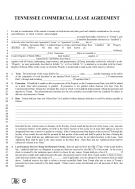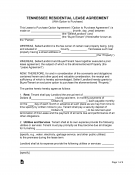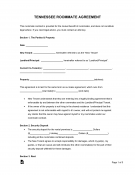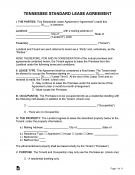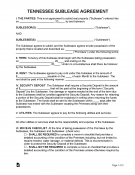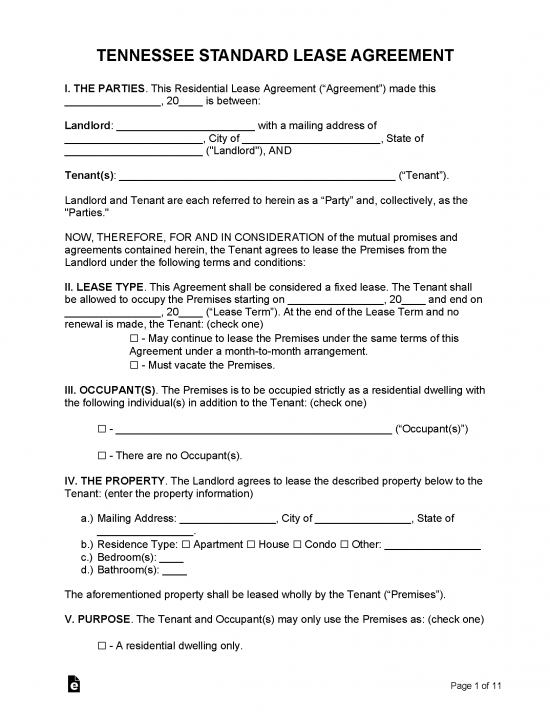Tennessee lease agreements are documents that govern tenancies in the state and contain the key terms of a lease of residential property. The agreement will usually contain terms such as the monthly rent and the utility responsibilities of the parties, as well as more specific items, such as whether pets are permitted. The agreement must be written and signed by both parties to be enforceable.
Contents
By Type (6)
- Commercial Lease Agreement
- Month-to-Month Lease Agreement
- Rent-to-Own Lease Agreement
- Roommate Lease Agreement
- Standard Lease Agreement
- Sublease Agreement
Download: Adobe PDF, MS Word, Rich Text Format
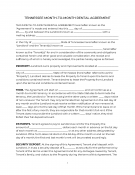 Month-to-Month Lease Agreement
Month-to-Month Lease Agreement
Download: Adobe PDF, MS Word, Rich Text Format
Download: Adobe PDF, MS Word, Rich Text Format
Download: Adobe PDF, MS Word, Rich Text Format
Download: Adobe PDF, MS Word, Rich Text Format
Download: Adobe PDF, MS Word, Rich Text Format
Landlord-Tenant Laws
Statutes – Title 66, Chapter 28 (Uniform Residential Landlord and Tenant Act)
Required Disclosures (3)
Agent/Landlord Identification – The lease agreement or another writing provided to the tenant before move-in day must include the names and contact information for the property owner and manager, as well as an address where notices and complaints may be received. (§ 66-28-302)
Lead-Based Paint Disclosure – If the property being leased contains a dwelling unit erected prior to 1978, then the landlord must inform the tenant of the hazards of lead-based paints.
Showings – If a landlord plans to show the property to other prospective renters within thirty (30) days of the termination of the tenancy about to begin, then the landlord must include a provision permitting this in the lease agreement. The landlord must grant at least twenty-four (24) hours notice before doing so. (§ 66-28-403)
Security Deposit Laws
Maximum Amount ($)
There is no limit to what a landlord may charge as a security deposit codified in Tennessee law.
Returning to Tenant
Landlords may retain a portion of the security deposit to cover the cost of unpaid rent and repairs to the property, other than those resulting from normal wear and tear. As the end of a lease approaches, a tenant may request an inspection of the property for the purpose of assessing damages and determining how much, if any of the security deposit the landlord will be able to retain.
The tenant has the right to conduct the inspection with the landlord and the inspection form they produce will be conclusive; if the tenant disagrees with the landlord’s assessment, the tenant should indicate as such on the inspection form, and may later bring an action in court to recover the cost of those items. If there are any funds remaining after the deductions, the landlord shall notify the tenant by mail to the tenant’s last known address.
The tenant must respond in order to claim these funds; if the tenant does not respond within sixty (60) days of this notice, the remaining funds become property of the landlord. (§ 66-28-301)
When is Rent Due? (grace period)
Rent is due on the day chosen in the lease agreement. For purposes of assessing a late fee, there is a five-day grace period. (§ 66-28-201)
Eviction Notice (non-payment)
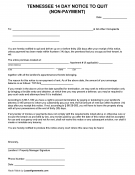 14-Day Notice to Pay or Quit – If a tenant does not pay rent on the date that it is due, the landlord may provide the tenant with notice stating that, if all owed rent is not provided within fourteen (14) days of the date on the notice, then the landlord may terminate the tenancy. Landlords and tenants may reduce the 14-day period if they negotiate such a provision in the lease agreement, but may in no case reduce it to fewer than five (5) days’ notice. (§ 66-28-505)
14-Day Notice to Pay or Quit – If a tenant does not pay rent on the date that it is due, the landlord may provide the tenant with notice stating that, if all owed rent is not provided within fourteen (14) days of the date on the notice, then the landlord may terminate the tenancy. Landlords and tenants may reduce the 14-day period if they negotiate such a provision in the lease agreement, but may in no case reduce it to fewer than five (5) days’ notice. (§ 66-28-505)
Download: Adobe PDF
Maximum Fees ($)
Late Rent Penalties
Late rent fees shall not exceed ten percent (10%) of the amount that the tenant has failed to pay that month. (§ 66-28-201)
NSF Checks
Tennessee law does not specify the maximum fee that landlords may impose for providing a rent check with insufficient funds. Best practice is to name the fee in the lease agreement and for the fee to be reasonable.
Tenant’s Unclaimed Property
The state code does not provide guidelines for how to handle a tenant’s personal property left behind after the scheduled end of a lease agreement. In cases where the landlord reasonably suspects that a tenant has abandoned a property, the landlord should remove the tenant’s possessions from the property and store them for at least thirty (30) days.
The landlord should make the possessions available for the tenant to reclaim during this period. If the tenant does not claim the possessions, the landlord may dispose of or sell the possessions, and apply the proceeds to the cost of storing the property, as well as any rent, fees, repairs or cleaning costs owed by the tenant. Any money left over from the sale must be held by the landlord on behalf of the tenant for at least six (6) months after the sale. (§ 66-28-405)
